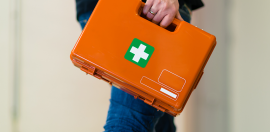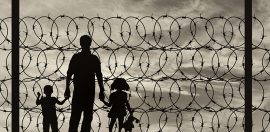Creating a compassionate classroom

Gandel Holocaust Program participants listening to the testimony of Holocaust survivor Rena Quint during their seminar at Yad Vashem, Israel, in January 2023. Image supplied.
31 January 2023 at 1:53 pm
A philanthropy-backed education program aims to build an inclusive society, combat discrimination and warn against spreading misinformation.
As the Australian school year kicks off for 2023, one group of teachers are aiming to create a more compassionate classroom, empowered by their learnings from a philanthropy-backed education program.
Run by the Gandel Foundation, the Gandel Holocaust Studies Program for Australian Educators aims to equip non-Jewish secondary school teachers with practical tools to address the Holocaust in an age-appropriate and factual manner, and in so doing, help to reduce instances of anti-semitism.
The global Jewish community commemorated International Holocaust Remembrance Day last Friday, which acknowledges the anniversary of the liberation of the Auschwitz-Birkenau concentration camp and the six million Jewish victims of the Holocaust, also called the Shoah.
It is particularly timely given the growing threat of far-right extremism in Australia, which has seen Victoria become the first state to ban the Nazi swastika, and other states taking similar actions including the recent consideration to outlaw the Nazi salute.
“The Gandel program trains and equips teachers from around Australia so they learn and understand how best to teach about the Holocaust in a professional, skillful, empathetic and contemporary way,” said Gandel Foundation CEO Vedran Drakulic OAM.
“Through such deep and meaningful Holocaust education, the Gandel teachers play a critical role in helping to uphold, preserve and protect the memory of the Holocaust for future generations.
“Not only that – as importantly, teachers also help ensure we continue to build a more welcoming and a more compassionate society for all.”
Almost 400 Australian educators have taken part in the one-year program over the past decade – 39 this year alone – which is delivered in partnership with the Yad Vashem World Holocaust Memorial Centre’s International School for Holocaust Studies in Israel.
Taught by international Holocaust educators and incorporating first-hand accounts from survivors, the program aims to teach students to become informed and active citizens, protect democracy and value a diverse and inclusive society.
It covers the challenges of teaching the Holocaust in the digital age, the use of social media in spreading misinformation, and the danger of discriminatory beliefs and behaviours.
For Bianca Moore, a humanities, English and performing arts teacher at St. Augustine’s College Kyabram in north central Victoria, participating in the program was especially important given the regional location of her school.
“Being from our small town, my students have no exposure to different cultures, so empathising with minority groups is challenging for them,” Moore told Pro Bono News.
“As a teacher, I am excited to impart my knowledge with my fellow colleagues and therefore create rich learning experiences around understanding the tremendous loss of Jewish life during the Shoah.”
According to the 2022 Gandel Holocaust Knowledge and Awareness in Australia Survey, almost a quarter (24 per cent) of Australians aged 18 years or older have little to no knowledge of the Holocaust – with that number rising to 30 per cent among millennials – and over 70 per cent know nothing about Australia’s own connections to the Holocaust.
On average, those with comparatively higher levels of Holocaust knowledge and awareness were found to have warmer feelings towards minority or disadvantaged groups, including asylum seekers and First Nations communities. Two thirds (66 per cent) believe Holocaust education should be compulsory in schools.
“It is crucial to teach students about the Shoah, because it’s not just a study of war and causality numbers, it is a study of human behaviour. The Shoah shows us what can happen to the masses when they’re consistently bombarded with falsity,” continued Moore.
“Students need to be aware of anti-semitism, and how it is still prevalent in the world they live in today; many students see the Shoah as something that happened a long time ago, and do not realise the effects are still being felt to this day.
“Not only that, but the Shoah is something that can help students explore the concept of being a bystander or a perpetrator, and how they can ensure they are standing up for the people without a voice around them.”
The Gandel Holocaust Studies Program for Australian Educators won Philanthropy Australia’s Bolder Philanthropy Award in 2020.
Gandel Foundation is one of Australia’s largest independent private family philanthropic funds, and has invested over $150 million into supporting charitable and community causes since its inception in 1978.








